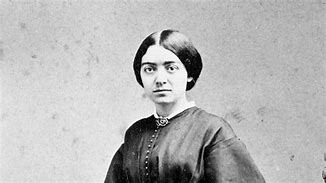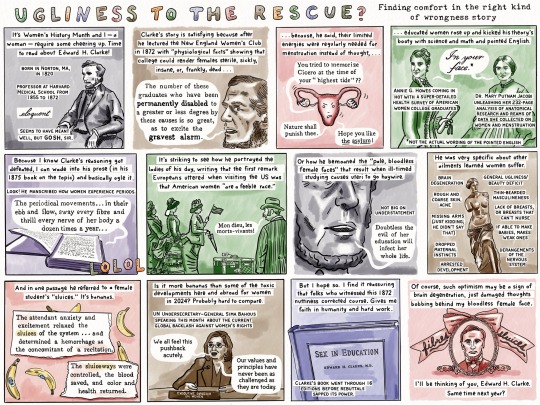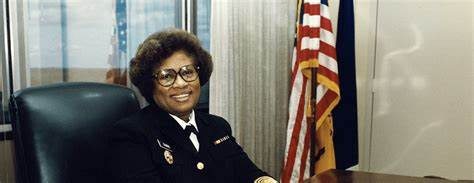#Mary putnam Jacobi
Text
In 1873, in the United States and across the Atlantic, Victorians began talking about a controversial new book: Sex in Education; or, A Fair Chance for the Girls. Written by the now-infamous Edward H. Clarke, a physician at Harvard University, the book cautioned middle-class families that their daughters were seriously at risk for illness, with catastrophic consequences. The author warned that young women had unique and fragile constitutions and that they could become physically depleted or sterile when taxed by the rigors of coeducational studies, especially during menstruation. As more and more young women sought higher education, Clarke's work set off a firestorm of debate, as women's rights activists rejected his alarming predictions.
Spearheading the fight against Clarke was Mary Putnam Jacobi, a physician from New York, who provided scientific ammunition to refute his claims. Her own study showed the opposite to be true: women were healthy when they were educated, mentally engaged, and physically active. Women were not perpetually ill during menstruation, nor were they hindered by their biology, she insisted. Social limitations, not biology, constrained women and threatened their health.
-Carla Bittel, Mary Putnam Jacobi & The Politics of Medicine in Nineteenth-Century America.
#carla bittel#Mary Putnam Jacobi#first wave feminism#women in science#menstruation#women’s rights movement
54 notes
·
View notes
Text
Mary Putnam Jacobi

Firstly, I want to talk about Mary Putnam Jacobi, MD, born in 1842, who’s medical career was filled with many firsts. In a time before coeducation in medical school was wide spread, Mary fought for equal access to clinical experience in schooling and created the Association of Advancement of Medical Education of Women, dedicated to addressing commonplace inequalities at the time.
Her most renowned work involved a paper written to combat a male doctor’s misunderstanding of menstruation, where he claimed that exertion during a period could become dangerous. Her paper received an award from Harvard university- the Boylston Prize- and is testament to the importance of women in healthcare. She was the first woman to win this prize, as well as the first woman to study at l’École de Médecine in Paris, and the first woman to be accepted into New York Academy of Medicine.
In her dying days, she wrote a paper titled ‘Symptoms of the Meningeal Tumor Compressing the Cerebellum. From Which the Writer Died. Written by Herself.’ In 1993, her legacy was immortalised as she was inducted into the National Women’s Hall of Fame.
Thank you for reading! See you tomorrow!!
#girlguiding#womens rights#girlguiding uk#blogging#mary putnam jacobi#medicine#women in medicine#badge#rangers#gg rangers
4 notes
·
View notes
Text

For Women’s History Month, something I drew for The Boston Globe’s Ideas section.
0 notes
Text
youtube
Il y a 181 ans naissait Mary Putnam Jacobi (1842-1906). Américaine, elle est une des premières femmes diplômées de la Faculté de médecine de Paris en 1871. Fervente partisane de l'instruction des femmes, la Commune de Paris la marque profondément dans ses engagement politiques.
#women in science#on this day#femme medecin#histoire des femmes#femme médecin#Commune de Paris#Youtube
5 notes
·
View notes
Text
In the grand tapestry of healthcare, certain figures often remain in the shadows, their contributions overlooked or underestimated. Among these unsung heroes are the women in pharmacy who have revolutionized the field with their dedication, innovation, and resilience. This blog celebrates these trailblazing women, highlighting their significant roles in shaping US pharmacy history and their enduring legacy.
The Early Pioneers: Laying the Foundation
The journey of women in pharmacy began long before they were formally recognized in the profession. In the 19th century, when societal norms severely restricted women's roles, a few courageous women defied conventions to pursue careers in healthcare. One of the earliest trailblazing women was Elizabeth Greenleaf, recognized as the first female pharmacist in America. Greenleaf’s work in the early 1700s laid the groundwork for future generations, showcasing the invaluable contributions women could make in pharmacy.
Another significant figure was Mary Corinna Putnam Jacobi, who, in the late 1800s, became a leading advocate for women in medicine and pharmacy. Jacobi’s insistence on rigorous scientific training for women was pivotal in challenging the stereotypes that limited women’s roles in healthcare. These early pioneers not only practiced pharmacy but also fought for the education and inclusion of women in the field, thus setting the stage for future advancements.
0 notes
Quote
Hence the danger, the vast and subtle danger, of so educating one half the population of a free State, that it has no vivid conception of Rights. Why should we wonder at the low tone which habitually prevails at present in relation to public affairs, when the women who stand as guardians at the fountain sources and household shrines of thought are trained to believe that there are no Rights, but only Privileges, Expediences, Immunities?
Mary Putnam Jacobi, Address to Committee on Suffrage, New York State Constitutional Convention, 1894
By the way, a wild read, this one, because it was literally the extreme conservative view on women’s rights of the day, and yet it had gems like this bit. Oh, yeah, and actually did some real advocating for women’s rights.
0 notes
Text


Power couple
33 notes
·
View notes
Text


In 1873, retired Harvard professor Edward H. Clarke’s Sex in Education, or, A Fair Chance for the Girls provoked controversy. In the book, Clarke states unequivocally that girls’ physiology requires that they not be educated in the same manner as boys. In particular, if they perform labor—including academic study—during their “periodical hemorrhage,” it can result in amenorrhea (absence of a menstrual period), anemia, chorea (involuntary jerky movements), hysteria, and even sterility.
Not surprisingly, supporters of gender equality found fault with Clarke’s book.
Read more about Mary Putnam Jacobi and 19th century "Period Politics" on our blog.
17 notes
·
View notes
Text
accadde...oggi: nel 1842 nasce Mary Corinna Putnam Jacobi, di Becky Little
accadde…oggi: nel 1842 nasce Mary Corinna Putnam Jacobi, di Becky Little

Le donne hanno le mestruazioni, e quindi non sono adatte a ricoprire cariche politiche, fare le astronaute e nemmeno studiare all’università: sono solo alcuni dei pregiudizi – spesso travestiti da teorie scientifiche – che nel corso dei secoli sono serviti a limitare la libertà femminile. Un celebre caso risale agli anni Settanta dell’Ottocento: Edward H. Clarke, professore alla facoltà di…
View On WordPress
0 notes
Link
MARY PUTNAM JACOBI: FITNESS, HEALTH & EXERCISE
Was the first woman to gain a medical degree from the École de Médecine in Paris, and was one of the few women practicing medicine in America in the 1870s. At the end of the 19th century, Edward Clarke, a physician in Boston,wrote a book saying women could not handle the rigors of higher education, especially while on their period. The concept fit in with the larger discussion about women being seen as inherently weak and prone to sickness. Jacobi was a living contradiction of Clarke’s conclusions. The year Clarke published his book on girls and education, Jacobi was a lecturer at the Woman’s Medical College of the New York Infirmary and treating patients at the clinic. In a rebuttal published in 1877, Jacobi said, “His recommendations lacked “experimental proof,” relied on “exaggeration of fact,” and served “many interests besides those of scientific truth.”
https://www.artinhealthcare.org.uk/ Art in Healthcare is an independent charity self-funded to provide essential visual art services to improve health and wellbeing in Scotland.

0 notes
Text
In the early 1860s, dramatic change swept through New York and the nation at large. During this volatile time of intense urbanization and industrialization, and the coming of the Civil War, religion was an empowering source for many Americans, particularly young evangelical women. Faith and domesticity provided some women comfort, security, and a sense of value in their communities. But for other women, religion was confining and limiting, especially when they struggled with the notion of conversion.
For Mary Putnam, several factors converged to draw her away from religion and toward a life of science. As she reached adulthood, she experienced a series of family crises and personal tragedies that forced her to reexamine her principles. She also began to address theological problems that she could not resolve. Just when her mind was confounded by religious questions, she found answers through the study of science, as she began informal medical training in 1860; her ideas then solidified as she moved on to the New York College of Pharmacy and the Female Medical College of Pennsylvania.
By questioning her Christian faith, Putnam also challenged what it meant to be a woman in nineteenth-century America. She was not alone. Interested in social reform and feminist causes, other women began to challenge the traditional authority of the church and express disagreement with women's place in the social hierarchy. Elizabeth Cady Stanton, leader of the American women's movement at midcentury, most famously critiqued the failures of religion to promote an equal and just society. When confronting the vast change and social problems of the nineteenth century, many women reformers began to place greater faith in scientific intervention. Putnam went further than most, making medicine and science her core values, much like a religion.
-Carla Bittel, Mary Putnam Jacobi & The Politics of Medicine in Nineteenth-Century America.
28 notes
·
View notes
Text
Jocelyn Elders

Today I want to talk about Jocelyn Elders, who, like Mary Putnam Jacobi, held many firsts throughout her career, and became the first African-American surgeon general. She grew up in poverty and first visited the doctor at age 16, where she first knew she wanted to become one. After a 3 year stint in the army, receiving a B.S. degree in Biology and working as a nurse’s aide, she went on to study Medicine, finish her residency, and specialise in, and become the first board certified, Pediatric Endocrinologist in her state.
During her time running the Arkansas health department, she doubled child vaccinations, improved prenatal healthcare, and expanded on support for elderly in care. She worked with public schools to promote sex education, proper hygeine and preventing substance use.
From what I have read about Jocelyn Elders, I believe she is a dedicated, passionate and well educated individual who’s career in medicine stretched far beyond treating her patients, but improving and striving for excellence in healthcare for all.
Thank you so much for reading, see you tomorrow!!
#girlguiding#womens rights#blog#blogging#gg rangers#rangers#gg uk#girlguiding uk#women in medicine#medicine
2 notes
·
View notes
Photo


Today we celebrate the birthday of Mary Putnam Jacobi (1842-1906). Jacobi was a medical aide during the Civil War and earned her M.D. from the Female Medical College of Pennsylvania in 1864. She continued her studies at the École de Médecine of the University of Paris, where she was the first female student. In 1871, Jacobi established a medical practice in New York City. She taught at the Woman’s Medical College of the New York Infirmary and campaigned for medical schools to admit women students. She wrote over a hundred medical papers, with The Question of Rest for Women during Menstruation (1876) receiving Harvard University’s Boylston prize. She was also an active suffragist, and one of the founders of the League for Political Education.
Caption: letter from Jacobi to U.S. Senator Carl Schurz, suggesting that Andrew Carnegie be urged to donate money to a women and children’s infirmary, rather than to one of his “everlasting libraries.”
For more information on Jacobi, see http://id.lib.harvard.edu/aleph/000605005/catalog
26 notes
·
View notes
Text
youtube
Il y a 116 ans mourrait Mary Putnam Jacobi (1842-1906). D'abord 1ère femme diplômé de pharmacie des Etats-Unis en 1863, elle fait partie des 3 premières femmes étudiantes en médecine à Paris. Elle milite activement pour que les femmes reçoivent la même formation pratique à la médecine que les hommes.
0 notes
Photo

hairtrnsplntz : At a time when many insisted women were biologically incapable of participating in medicine or science, Mary Putnam Jacobi argued that menstruation shouldn’t stop women from getting an education #sponsored Always https://t.co/uHh5r7TTCQ #hairtransplant #hairturkey #hairtranspl… #hairtransplant #hairtransplantturkey #hairstyle
0 notes
Video
(via A26-1-2 | Portrait of Mary Putnam Jacobi, reading, ca. 1860-… | Flickr)
14 notes
·
View notes